

Humanity’s Awesome, Terrifying Takeover of Evolution. Ezra klein I’m Ezra Klein, and this is “The Ezra Klein Show.”
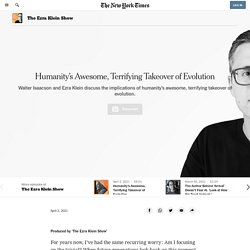
So over the past couple of years, there’s been this worry stalking my own work. What if I’m just wasting my time covering taxes and public options and Donald Trump and filibuster reform? What if the thing, the only thing that really matters right now is CRISPR, that everything else comparatively is just a sideshow — CRISPR. Over the past few decades, scientists have studied this enzyme bacteria used to recognize viruses and just cut them apart.
I’ve heard you talk about there being three technological revolutions, atoms, bits, and genes. Walter isaacson These are the three fundamental kernels of our existence, the atom, the bit — which are binary digits that can encode information — and the gene. How well do we understand the coding language here? As you know, we have about 3 billion pairs of letters that make up our DNA. So it sounds to me there’s almost a ladder of programming complexity here. Bingo. Yeah. And same is true. Future - How meal timings affect your waistline. When young adults start university, they often gain weight.
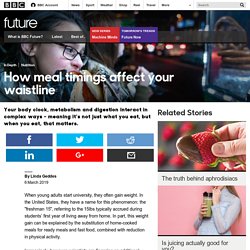
In the United States, they have a name for this phenomenon: the "freshman 15", referring to the 15lbs typically accrued during students’ first year of living away from home. In part, this weight gain can be explained by the substitution of home-cooked meals for ready meals and fast food, combined with reduction in physical activity. Increasingly, however, scientists are fingering an additional suspect: circadian disruption, brought about by a culture of late-night eating, drinking, and inconsistent sleep patterns.
For decades, we’ve been told that weight gain, together with associated diseases such as type 2 diabetes and heart disease, are a simple matter of the quantity and type of food we consume, balanced with the number of calories we expend through exercise. But mounting evidence suggests that timing is also important: it’s not just what you eat, but when you eat that matters. You might also like: Adaptive Radiation. Adaptive Radiation am Beispiel der Darwinfinken Schema der Radiation der Darwinfinken aus einem gemeinsamen Vorfahren Schnabelformen verschiedener Darwinfinken Artbildung in isolierten Lebensräumen[Bearbeiten | Quelltext bearbeiten] Dies gilt aber nur in den Fällen, in denen der Lebensraum neu entstanden ist.
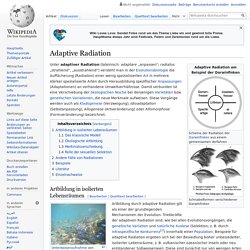
Zerfällt dagegen ein vorher zusammenhängender Lebensraum in getrennte Inseln, beobachtet man zwar auch hier, wie sich die nun verinselten Populationen morphologisch auseinanderentwickeln und neue Arten bilden, aber diese Prozesse finden sehr langsam statt. Die Mechanismen der beschleunigten Artbildung bei der Besiedlung neuer Inseln (tatsächlicher Inseln oder Habitat-Inseln) stellen einen Testfall für die Evolutionstheorie dar und haben deshalb wissenschaftlich besondere Beachtung gefunden.
Eine Art, die einen neu entstandenen Lebensraum besiedelt, wird normalerweise relativ unspezialisiert sein. Biologie - Der Mikroben-Versand - Gesundheit. Braunschweiger Leibniz-Institut DSMZ lagern 65 000 verschiedene Batkerien-, Viren- oder Pilzarten.
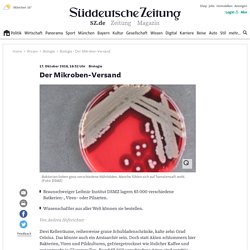
Wissenschaftler aus aller Welt können sie bestellen. Zwei Kellerräume, reihenweise graue Schubladenschränke, kalte zehn Grad Celsius. Das könnte auch ein Amtsarchiv sein. Doch statt Akten schlummern hier Bakterien, Viren und Pilzkulturen, gefriergetrocknet wie löslicher Kaffee und gut verpackt in Glasampullen. Invasion of the ‘frankenbees’: the danger of building a better bee.
The spring of 2008 was brutal for Europe’s honeybees.
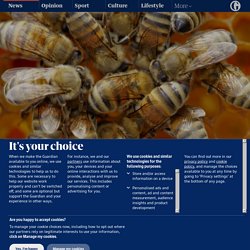
In late April and early May, during the corn-planting season, dismayed beekeepers in Germany’s upper Rhine valley looked on as whole colonies perished. Millions of bees died. France, the Netherlands and Italy reported big losses, but in Germany the incident took on the urgency of a national crisis. “It was a disaster,” recalled Walter Haefeker, German president of the European Professional Beekeepers Association.
“The government had to set up containers along the autobahn where beekeepers could dump their hives.” An investigation in July of that year concluded that the bees in Germany died of mass poisoning by the pesticide clothianidin, which can be 10,000 times more potent than DDT. The die-off forced a reckoning among European farmers. Honeybees originated in Eurasia roughly 35m years ago, and as long as they have had steady access to flowering plants, they have thrived. I was also shown the transgenic queens. The Key to a Long Life Has Little to Do With ‘Good Genes’ Cross Section: Sir Venki Ramakrishnan – Science Weekly podcast.
Competition, as defined by the Oxford living dictionary, is ‘the activity or condition of striving to gain or win something by defeating or establishing superiority over others’.
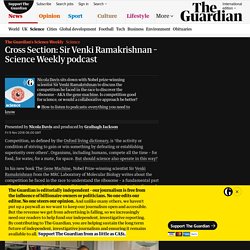
Organisms, including humans, compete all the time – for food, for water, for a mate, for space. But should science also operate in this way? In his new book The Gene Machine, Nobel Prize-winning scientist Sir Venki Ramakrishnan from the MRC Laboratory of Molecular Biology writes about the competition he faced in the race to understand the ribosome – a fundamental part of how DNA is encoded into the stuff that all organisms need to develop, live and reproduce. Nicola Davis sits down with Venki to discuss the idea of competition in science – could it be driving innovation or is it damaging research?
Support The Guardian The Guardian is editorially independent.